“There’s also a paycheck in there.”
“Ah, good news.”
“I wouldn’t get excited. Seems she worked at the car wash north of town and they owed her for last week. Probably not much. Somebody brought that to the jail too.”
“So she’s fired?”
“Looks that way. Somebody said she was also workin’ at a convenience store over by the high school. You checked this gal out?”
“No, but I’m sure you have.”
“She was born in Oregon, thirty-two years ago. Her father was in the air force, not a pilot, and they moved around. She grew up on the base in Biloxi but her father got killed in some kind of explosion. She dropped out of school at sixteen when she gave birth to Drew. The proud papa was some tomcat named Barber, but he disappeared a long time ago. Two years later she had the girl, different daddy, some dude named Mabry. He probably never knew it. She lived here and there, the record is spotty. When she was twenty-six she married a gentleman named Kolston, but the romance broke up when he went to prison for thirty years. Drugs. Divorce. She served two years in Texas for dealing and possession. Not sure what happened to the kids because, as you know, that family court stuff is sealed. Needless to say, they’ve had a rough time. Things’ll get worse.”
“I would say so. They’re homeless. She’s unemployed, facing surgery tomorrow, no place to go when she’s released from the hospital. Her daughter is living with their preacher. Her son is in jail.”
“You want sympathy, Jake?”
Jake took a deep breath and studied his friend. “No.”
Ozzie turned to leave and said, “When you get the chance, ask that kid why he pulled the trigger.”
“He thought his mother was dead.”
“Well, he was wrong, wasn’t he?”
“Yes he was. So let’s kill him, too.”
Jake held the envelope and watched the sheriff disappear around a corner.
—
FROM YEARS OF observation and experience, Jake had become an expert on the rhythm and flow of commerce around the square, and he knew that at four-thirty in the afternoon the Coffee Shop would be deserted and Dell would be behind the counter wrapping cheap flatware with paper napkins and waiting for the clock to hit five so she could call it a day. During breakfast and lunch she oversaw the gossip, stirring it up when things were slow, throttling it back when it became too vicious. She listened hard, missed nothing, and was quick to reprimand a raconteur who veered off script. Foul language was not tolerated. A dirty joke could get you banned. If a customer needed to be insulted, she was quick with a quip and didn’t care if he never came back. Her recall was legendary and she had often been accused of quickly scribbling down notes to herself to record important rumors. When Jake needed the truth, he ventured over at four-thirty and sat at the counter.
She poured coffee and said, “We missed you these past two mornings.”
“That’s why I’m here now. What are they saying?”
“It’s big news, obviously. First murder in five years, since Hailey. And Stu was a popular guy, good deputy, came in here for lunch every now and then. I liked him. Nobody knows the kid.”
“They’re not from here. The mother met Kofer and a romance ensued. Pretty sad little family, really.”
“That’s what I hear.”
“Am I still the favorite lawyer?”
“Well, they’re not going to talk about you with me close by, now are they? Prather said he wished they could find another lawyer, said Noose dumped the kid on you. Looney said you had no choice, said Noose would replace you later. Stuff like that. No criticism yet. You’re worried about it?”
“Sure. I know these guys well. Ozzie and I have always been close. It’s not comforting to know that the cops are pissed off.”
“Watch your language. They’re okay, I think, but you need to show up tomorrow and see how they act.”
“I plan to.”
She paused and glanced around at the empty café, then leaned in a bit closer. “So, why did the kid shoot him? I mean, he did do it, right?”
“There’s no doubt about that, Dell. I won’t let them interrogate the kid but they don’t have to. His sister told Moss Junior that he shot Stuart. Doesn’t give me much to work with, you know?”
“So, what was the motive?”
“I don’t know, and I’m not that involved. Noose told me to just hold the kid’s hand for the first month until he finds someone else. If it goes to trial maybe they’ll find a motive, maybe not.”
“Are you going to the funeral?”
“The funeral? I haven’t heard.”
“Saturday afternoon, at the National Guard Armory. Just heard about it.”
“I doubt if I’ll be invited. You going?”
She laughed and said, “Of course. Name the last funeral I missed, Jake.”
He could not. Dell was known for attending two and sometimes three funerals a week and fully recapping each as she served breakfast. For years Jake had heard tales of open caskets, closed caskets, long sermons, bawling widows, jilted children, family dustups, beautiful sacred music, and bad organ recitals.
“I’m sure it will be a show,” he said. “It’s been decades since we buried an officer.”
“You want some dirt?” she asked as she once again glanced around the café.
“Of course.”
“Well, word is that his people are having trouble getting a preacher. They don’t do church, never have, and all the preachers they’ve stiff-armed over the years are saying no. Can’t blame them, can you? Who’d want to stand up at the pulpit and say all the usual happy stuff about a man who never darkened their door?”
“So, who’s officiating?”
“Don’t know. I think they’re still scrambling. Come back in the morning and maybe we’ll know something.”
“I’ll be here.”
—
THE TABLE IN the center of Lucien’s downstairs workroom was covered with thick lawbooks, legal pads, and discarded papers, as if the two non-lawyers had been plowing through research for days. Both wanted to be lawyers and Portia was well on her way. Lucien’s glory days were far in the past but he still, at times, found the law fascinating.
Jake walked in, admired the mess, and pulled up another mismatched chair. “So, please tell me your brilliant new legal strategies.”
“Can’t find one,” Lucien said. “We’re screwed.”
Portia said, “We’ve tracked down every youth court case over the past forty years and the law doesn’t budge. When a kid, a person under the age of eighteen, commits a murder, rape, or armed robbery, original jurisdiction is in circuit court, not juvenile.”
“What about an eight-year-old?” Jake asked.
“They don’t rape much,” Lucien mumbled, almost to himself.
Portia said, “In 1952, an eleven-year-old boy in Tishomingo County shot and killed an older kid who lived down the road. They kept him in circuit court and put him on trial. He was convicted and sent to Parchman. Can you believe that? A year later the Mississippi Supremes said he was too young and kicked it back to youth court. Then the legislature got involved and said the magic age is thirteen and older.”
Jake said, “It doesn’t matter. Drew is not even close, at least in age. I’d put his emotional maturity at about thirteen, but I’m not qualified.”
“Have you found a psychiatrist?” Portia asked.
“Still looking.”
“And what’s the goal here, Jake?” Lucien asked. “If he says the boy is certified batshit crazy, Noose ain’t movin’ the case. You know that. And can you really blame him? It’s a dead cop and they have the killer. If the case went to youth court the kid would be found guilty and put away in a kiddie jail. For two years! And the day he turns eighteen, youth court loses all jurisdiction and guess what happens.”
Читать дальше












![Джон Гришэм - Апелляция [Фейк]](/books/403002/dzhon-grishem-apellyaciya-fejk-thumb.webp)